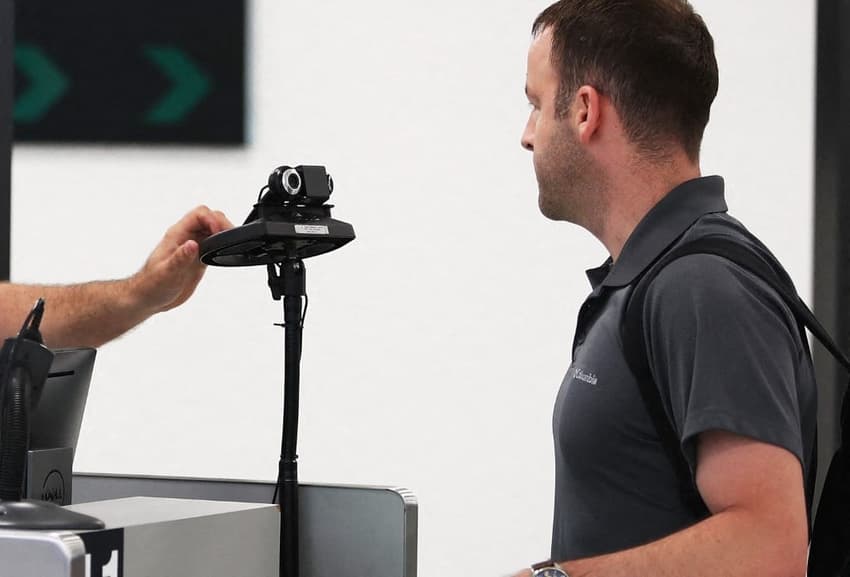Facial recognition starts to replace boarding passes at Spain's airports

Spanish airline Vueling has launched a facial recognition system which gives passengers the chance to avoid taking out their documentation at the airport’s security and boarding gates, using their face as ID instead.
Facial recognition, as divisive as it may be, is becoming increasingly mainstream around the world, and Spain appears to be following this trend.
Spanish airports are one of the places where the biometric technology has started to be more noticeable, as airline Vueling recently began offering this facial scanning service to passengers as a quicker way to get through security checks and into their plane seats.
The Vueling app now offers passengers travelling to or from certain airports in Spain the prompt during their online check-in of “Want to go faster?” and “avoid queues and waits”, to which they then can agree to and activate facial recognition.
When their faces have been scanned, paired with their IDs and boarding passes, the registration process is complete.
For it to work, the phone has to either be an Android with NFC or an iPhone with iOS13 or later.
The facial recognition registration can also be carried out at Vueling’s check-in machines at the airports.
Once at the turnstiles at the airport security checkpoint and at the boarding gate, cameras using the facial recognition software analyse passengers’ faces and open up the doors once they’ve been verified.
The reason why the service is being promoted as a way to fast-track travel through the airport - apart from not having to take out boarding passes and ID - is that there are exclusive access points indicated with the facial recognition icon which presumably deal with far less passenger traffic.
Vueling has been offering the service since November 2023 at five airports: Madrid, Barcelona, Palma, Menorca and Ibiza. It will soon be available at Tenerife North and Gran Canaria airports.
Vueling’s facial recognition option is completely voluntary.
It forms part of a wider facial recognition agreement put together by Spanish airport operator Aena, which Iberia, Air Europa and Binter have also joined.
Foreigners with a credit card-sized biometric Spanish residency document (the TIE, not the green certificate) can also register for the facial recognition service on airlines that have implemented it. It is unclear if all foreign biometric passports can be used.
DNIs or TIEs are valid for domestic flights and EU/Schengen travel, but for flights to third countries the facial recognition technology only accepts passports.
It’s also possible to register your facial recognition details directly with Aena, so that when the other airlines implement the scheme, you can use the system without having to register again,
According to Aena’s website, "the data is never shared with any third party, it never leaves Aena's systems, your airline only receives the identification data and your boarding pass that it has issued to you itself."
READ ALSO:
Comments
See Also
Facial recognition, as divisive as it may be, is becoming increasingly mainstream around the world, and Spain appears to be following this trend.
Spanish airports are one of the places where the biometric technology has started to be more noticeable, as airline Vueling recently began offering this facial scanning service to passengers as a quicker way to get through security checks and into their plane seats.
The Vueling app now offers passengers travelling to or from certain airports in Spain the prompt during their online check-in of “Want to go faster?” and “avoid queues and waits”, to which they then can agree to and activate facial recognition.
When their faces have been scanned, paired with their IDs and boarding passes, the registration process is complete.
For it to work, the phone has to either be an Android with NFC or an iPhone with iOS13 or later.
The facial recognition registration can also be carried out at Vueling’s check-in machines at the airports.
Once at the turnstiles at the airport security checkpoint and at the boarding gate, cameras using the facial recognition software analyse passengers’ faces and open up the doors once they’ve been verified.
The reason why the service is being promoted as a way to fast-track travel through the airport - apart from not having to take out boarding passes and ID - is that there are exclusive access points indicated with the facial recognition icon which presumably deal with far less passenger traffic.
Vueling has been offering the service since November 2023 at five airports: Madrid, Barcelona, Palma, Menorca and Ibiza. It will soon be available at Tenerife North and Gran Canaria airports.
Vueling’s facial recognition option is completely voluntary.
It forms part of a wider facial recognition agreement put together by Spanish airport operator Aena, which Iberia, Air Europa and Binter have also joined.
Foreigners with a credit card-sized biometric Spanish residency document (the TIE, not the green certificate) can also register for the facial recognition service on airlines that have implemented it. It is unclear if all foreign biometric passports can be used.
DNIs or TIEs are valid for domestic flights and EU/Schengen travel, but for flights to third countries the facial recognition technology only accepts passports.
It’s also possible to register your facial recognition details directly with Aena, so that when the other airlines implement the scheme, you can use the system without having to register again,
According to Aena’s website, "the data is never shared with any third party, it never leaves Aena's systems, your airline only receives the identification data and your boarding pass that it has issued to you itself."
READ ALSO:
Join the conversation in our comments section below. Share your own views and experience and if you have a question or suggestion for our journalists then email us at [email protected].
Please keep comments civil, constructive and on topic – and make sure to read our terms of use before getting involved.
Please log in here to leave a comment.